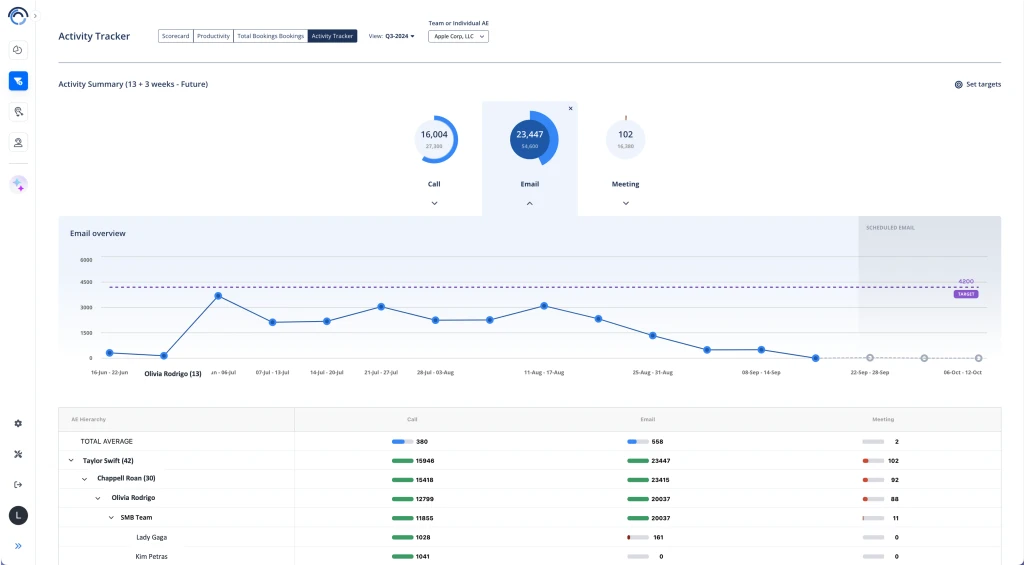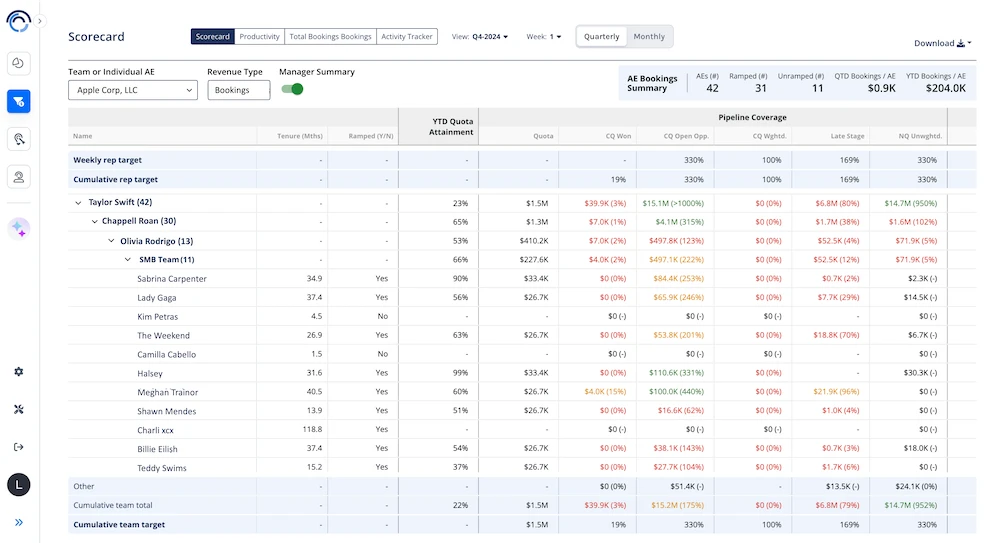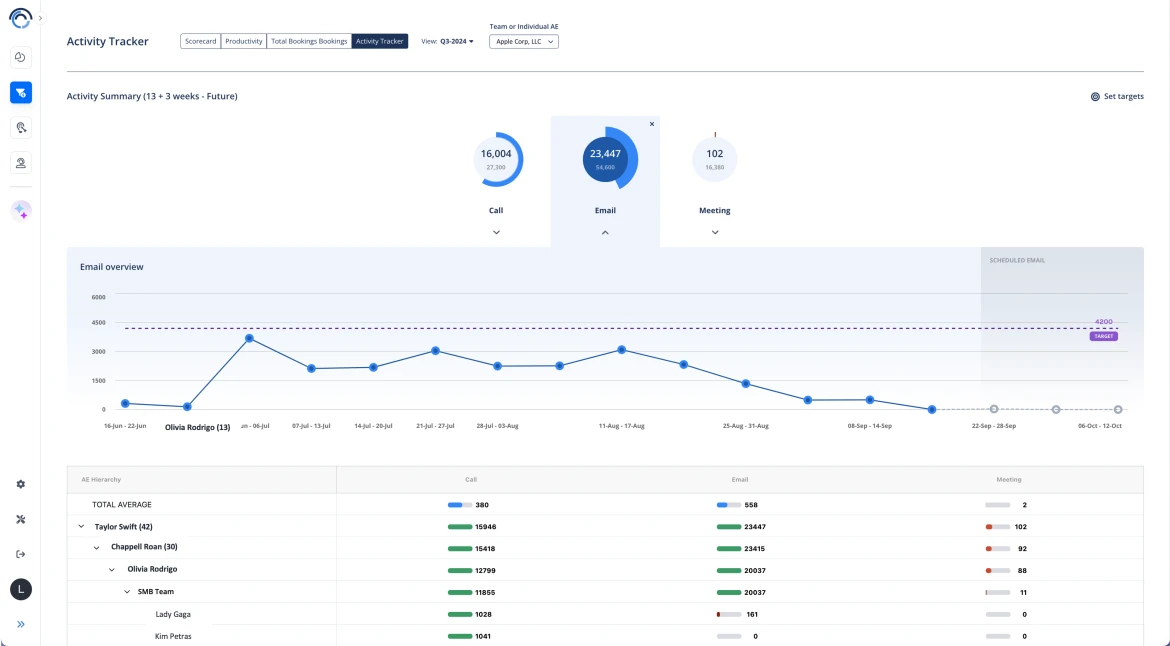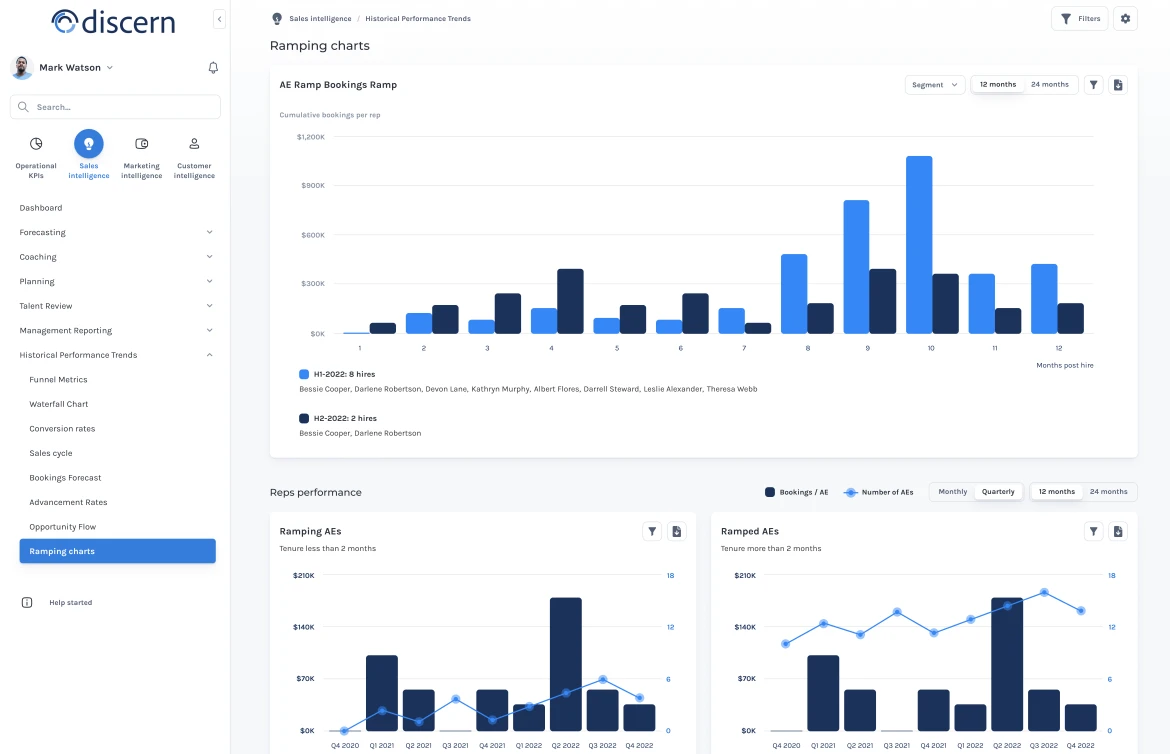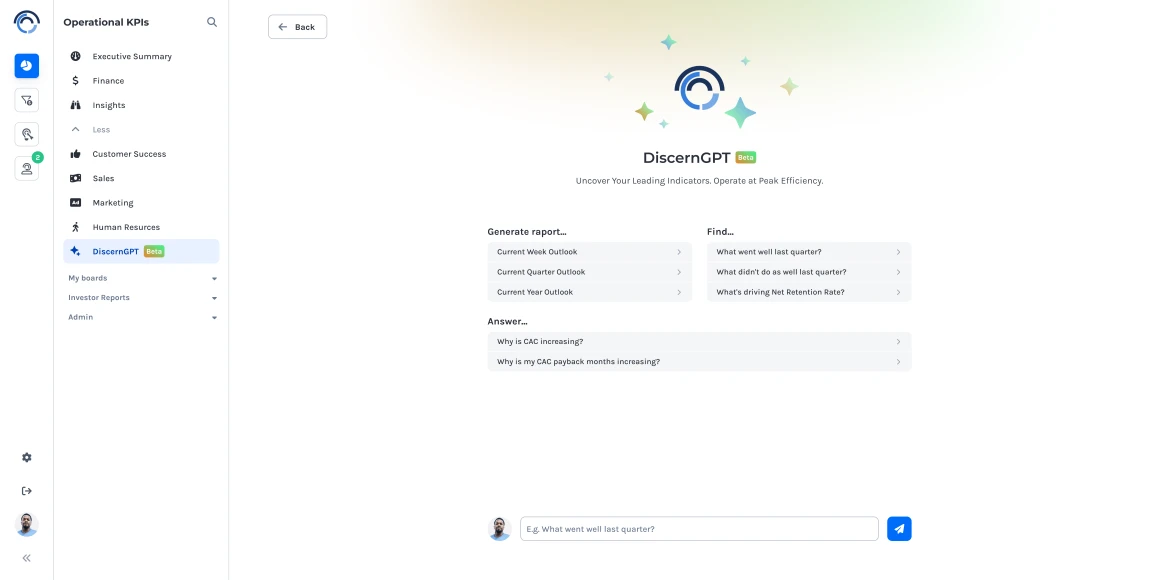Improving sales performance for global sales teams
The SaaS Sales Dilemma.
The SaaS sales landscape has never been more competitive. With so many SaaS companies vying for attention, standing out and closing deals has become increasingly challenging. Buyers are highly informed, often completing most of their research before engaging with a sales rep. Despite this, sales cycles are lengthening, and budgets are tighter, meaning SaaS businesses must be smarter in how they train and coach team members.
Discern equips sales leadership with the insights and analytics needed to guide their sales teams effectively in this trick environment. Our Team Management app includes powerful tools like sales scorecards, activity tracking, and sales capacity planning, ensuring your entire team is optimized for productivity and efficiency. Plus, Discern’s AI RevOps assistant makes it easy for sales managers to quickly answer critical questions.
Key Benefits

Healthy Competition
Foster a company culture of continuous improvement with leaderboards and performance metrics that motivate individual team members and celebrate team wins.

Deploy Targeted Coaching
Enhance the sales process by providing individualized support to sales reps, ensuring every member hits their sales targets and contributes to overall success.

Proactively Mitigate Risks
Leverage real-time data to identify potential risks to hitting individual or team goals and implement targeted corrective actions that ensure your team can hit revenue targets.

Plan with Confidence
Optimize your sales capacity planning process to ensure your team is always aligned with business goals and set up to hit aggressive growth targets.
Discern FAQs
Discern offers flexible pricing designed to accommodate sales teams of all sizes, from small startups to established enterprises. Pricing for our Sales Team Management app typically starts around $250 per quota-carrying rep.
Discern offers a host of sales tools meant to optimize your sales process including a Forecasting app that combines both an AI forecast and a bottoms up forecast to help you get an accurate understanding into bookings potential. Click here to learn more about our bookings forecast.
Discern also offers a Pipeline Analysis and Planning app that makes it easy to run opportunity management, pipeline planning, and historical performance analytics. Click here to learn more about Discern’s Pipeline Analysis and Planning app.
Lastly, our operational intelligence solution makes it easy to integrate all sales (plus finance team, marketing team, customer team, HR, etc.) data in one place and create customer sales dashboards and sales leaderboards. Click here to learn more about Operational Intelligence.
We need to work with you to map Discern to your unique sales hierarchy in your CRM software so it will take about a day or two to get you fully onboarded after kickoff.
Set Your Sales Team Up for Success
Explore how Discern can level up your sales team management with tools designed to optimize performance and drive growth.
Industry FAQs
Account Executives (AEs) are frontline sales reps responsible for closing deals and driving revenue. Sales Development Representatives (SDRs) focus on lead generation and qualification, setting up meetings for AEs. Sales Managers oversee the entire or a part of the sales organization, ensuring targets are met and providing coaching and support.
In addition to these core roles, some sales teams also include specialized positions. Sales Engineers offer technical expertise, bridging the gap between the product and the customer’s needs. Revenue Operations (RevOps) is crucial for managing data and analytics across sales, marketing, and customer success teams, ensuring every aspect of the sales process is optimized for maximum efficiency.
Building and managing a successful sales team starts with strategic hiring. It’s essential to bring on individuals who not only possess strong sales skills but also align with your company’s culture and values. Clearly defining roles and setting expectations from the outset ensures everyone understands their responsibilities and how they contribute to the sales team’s overall goals.
Once the right people are in place, focus on onboarding and continuous development. A robust onboarding process helps new hires ramp up quickly, while ongoing coaching and training are key to maintaining high performance. This might include regular training sessions, one-on-one coaching, and constructive feedback to help sales reps grow and improve.
To sustain success, establish clear metrics for tracking performance, such as sales scorecards, which provide valuable insights into how well the team is meeting its goals. Creating a supportive environment that fosters healthy competition and collaboration is also crucial. Regularly reviewing and adjusting your sales strategy ensures that your sales organization stays aligned with changing market conditions and business goals.
Sales management encompasses several critical functions to ensure the team meets its goals and contributes to the company’s success. A key element is setting clear targets that align with broader business objectives. This involves carefully planning and managing the sales cycle, from lead generation through to closing deals, to ensure each stage is optimized for success.
Recruiting and training new account executives is another vital function of sales management, equipping the team with the necessary skills and knowledge to perform at a high level. Providing ongoing coaching and evaluating performance are equally important, helping to maintain and enhance productivity across the team.
Sales capacity planning is also essential, ensuring you have the right number of reps to meet demand without overextending resources. Effective sales management requires using sales technology, such as CRM software and performance dashboards, to monitor progress and make data-driven decisions. These tools help sales leadership stay informed and agile in a rapidly changing market.
Sales compensation typically combines a base salary with commissions based on individual and team performance. This structure motivates AEs to meet or exceed their quotas, directly contributing to revenue targets. The balance between base salary and commission can vary but is usually designed to reward top performers while providing a stable income.
Tracking performance is essential to ensure compensation aligns with actual results. Tools like sales scorecards or sales leaderboards monitor key metrics such as revenue generated, deal closure rates, and new client acquisition. These scorecards offer a clear picture of each sales rep’s performance, helping motivate employees to improve productivity.
Sales leaderboards can also foster healthy competition by ranking AEs based on their performance. Regular performance reviews, combined with these tools, allow sales leaders to offer targeted coaching and adjust strategies as needed. This approach ensures every sales team member contributes to the company’s success while being fairly compensated.
A sales scorecard, also called a sales leaderboard, is a strategic tool used to track and measure the performance of sales teams and individual reps. It typically includes KPIs that align with the company’s revenue goals, such as revenue targets, deal closure rates, and customer acquisition costs. By offering a clear, visual representation of these metrics, a sales scorecard enables sales leadership to quickly assess how well the team is performing and identify areas needing improvement.
Sales scorecards are not just about tracking numbers; they help set clear expectations and goals for the sales team. By regularly reviewing the scorecard, sales leaders can provide targeted feedback and make informed decisions on where to focus coaching efforts. This ongoing process ensures the entire sales team works toward common goals, fostering accountability and driving performance.
Additionally, the scorecard allows sales teams to track progress over time, which is crucial for adjusting strategies and staying aligned with business objectives. Whether identifying top performers or areas where the team is falling short, a sales scorecard is essential for managing and improving sales effectiveness.
“Sales ramp” refers to the period during which a new sales rep becomes fully productive and capable of meeting their targets. This ramp-up period is crucial for both the rep and the company, as it determines how quickly the new hire can start contributing to revenue. The duration of the sales ramp can vary widely, depending on factors like the complexity of the sales cycle, the rep’s prior experience, and the level of training and support provided by the company.
Typically, a sales ramp period might last anywhere from a few months to a year. During this time, the rep gradually increases their sales activity—such as making more calls, conducting meetings, and closing deals—until they are fully onboarded and can realistically hit targets. The objective is to get the rep fully operational as quickly as possible without overwhelming them.
Effective sales ramp analytics are essential for tracking this progress. These analytics help managers monitor key indicators of the rep’s development and provide targeted coaching to address any challenges. By closely managing the ramp-up process, companies can ensure new hires integrate smoothly and start delivering results quickly.
Account Executive (AE) performance is a critical metric for any sales team, as AEs are directly responsible for closing deals and generating revenue. Evaluating AEs’ involves looking at several key indicators, such as the number of deals closed, revenue generated, and percentage of targets met. These metrics provide a clear picture of how effectively an AE contributes to the company’s revenue goals.
In addition to these quantitative measures, qualitative factors like the quality of customer relationships that AEs maintain are important. Strong relationships often lead to upselling and cross-selling opportunities, valuable for long-term revenue growth. AEs who can consistently build and maintain these relationships are usually top performers.
Regular pipeline reviews and the use of sales scorecards are essential tools for tracking these metrics. By analyzing the data, sales leadership can identify top performers who may be ready for additional responsibilities and those who may need extra coaching to reach their full potential. Focusing on AE performance ensures the sales team operates at peak efficiency, significantly contributing to the company’s success.
Sales activity tracking is a vital process for monitoring the day-to-day actions of AEs, ensuring they are engaging with prospects effectively and efficiently. This tracking involves recording key activities such as calls made, emails sent, meetings scheduled, and deals progressed through the sales pipeline. By keeping a close eye on these activities, sales managers can ensure that reps are on track to meet their quotas and identify any potential bottlenecks in the sales process.
Effective activity tracking provides several important benefits. First, it allows sales leadership to identify trends in rep productivity, highlighting who is consistently engaging with prospects and who may need additional support. It also helps in forecasting future sales by providing data on the volume and quality of sales activities, which directly correlates with deal closure rates.
Moreover, activity tracking enables more targeted coaching and training by pinpointing specific areas where a rep may be struggling, such as making enough outbound calls or effectively following up on leads. By addressing these issues promptly, sales managers can help reps improve their behaviors, ultimately leading to higher sales and better overall team productivity.
